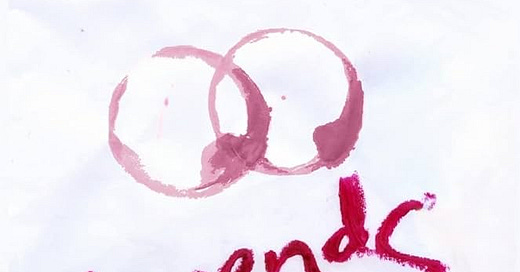All We Are Is Red Dust in the Wind
I read a Chinese classic. Plus more nostalgia (not for the Qing Dynasty)
Creatures, I both read and write books. In this edition of your doughty delight-filled Dragon, you get a bit of both!
First up, The Dream of the Red Chamber, an 18th-century Chinese classic which I read in the Wang translation. No clue if that’s good or not! What is it like to dive into this book without any prior grounding in the culture of Qing Dynasty China?
It’s a pleasure, really. The Dream of the Red Chamber swirls around two intertwined families in their double compound. They drop scandalously sexy purses in the garden and dawdle around not studying for their exams. I enjoyed the attention to the financial management of the houses, and also the lush decision to translate the women’s names, so the men are just sounds but the women are Bright Design, Purple Cuckoo, Black Jade. The central romance is striking: Pao-yu, the girlish son, the lone boy in a world of powerful women, and his doomed beloved, the melancholy beauty Black Jade.
There’s a theme of decline, and of retreat to the Buddhist monastic life, away from the world of mortal cares. Monasticism is driven by “disillusionment”: detachment, but without any real hint of the passionate, devoted, or erotic character of the monastic relationship with God in Christianity. The practical and romantic actions of the characters are always observed by these disillusioned monks and nuns, like a comic border on a love note. I enjoyed the contrast a lot; and the whole novel is fueled by the desire of a stone to go and see the mortal world, so even monastic detachment has its dissident.
I did like how Dream’s people keep forging onward in the face of decline and tragedy—there’s a strong “little mammals emerging after the age of the great dinosaurs” feeling to the very end of the novel—but it also means that you watch all the main characters just stroll past the various servant suicides their blithe romances leave in their wake.
Nostalgia Revisited
Here is an exchange with a reader, Michael, about my nostalgia outburst and also my first novel. Amends is set during the filming of a reality-TV show about alcoholism and recovery. I wrote it during my first year of sobriety. It is a comedy! I also wrote Punishment: A Love Story, a comedy about a woman returning home from federal prison, who begins to suspect that someone she meets at her local sadomasochists’ group is trapped in a cult. Enjoy, unless enjoyment isn’t the kind of thing you’re into….
Anyway, Michael writes:
Can you unpack this?
FOUR: Nostalgia is a way of keeping some emotions secret, by hiding them under cover of the past.
FIVE: There is an obvious case that nostalgia is a conservative emotion. But what the previous item suggests is that it is also an inherently camp and queer emotion.
ALSO I am rereading Amends, which I loved then and love now. When you write about alcoholics being oozey because they've crossed so many lines that used to define them…
I reply:
Ha, thank you!
Hm, I think any explanation will miss some things and possibly devolve into banality—I was intentionally running on vibes here!—but I think there were at least three elements of what I was getting at there:
* the obvious one, that people indulge in nostalgia when the thing they want to do goes against some social norm or internalized ethical belief they now have: “Times were better back when kids respected their elders—I remember when the paddle used to hang in the principal’s office!” That person does not actually hit kids. In a way, the thing they’re hiding is their ambivalence about the ways of the past, hidden under praise for it.
* “Times Square was better before Giuliani” aka I adapted as a criminal into a world that treated me like one, and rights are fun if you can get them but I miss knowing how to handle myself in the places where rights don’t go. This is pretty obviously a “queer” angle.
* Experiences that I feel like people expect me to treat as mere stepping-stones or developmental stages were in fact touchstones that foreshadowed my future and that I don’t want to move on from. (The “I” here being, I guess, a more resentful version of real-me.) Childhood friendship and its secrets might be the obvious and especially queer examples here. Queer nostalgia reverses the charge that *~*homosexuality*~* is immature, by evoking everything people long for in childhood/the past. ...Maybe. Maybe not!
Last word to Michael:
Also, I finished the reread of Amends, and honestly the book is shockingly good. A lot of gut punches, but also I laughed on every page?
If you, too, would like to get punched right in your laughing gut, you can get a hold of Amends here.
Amends cover design by Catherine Addington… winestain circles and lipstick scrawl by me. Blurb by Tim Powers for real!



Free till friday; you might enjoy it.
https://www.amazon.com/Tao-Christ-Understanding-Comparison-Christianity-ebook/dp/B0D8L7KZXV
IF you speak & read Chinese then this work by Sa Dingding is a good counterpart to "Dust in the Wind" https://www.youtube.com/watch?v=Wgme4iRpNjg
Chinese poetry is the world's best. English language poetry is second best. Unlike English poetry many Chinese poems are a wonderful for children and adults alike.